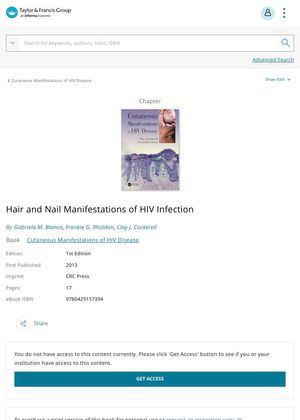Hair and Nail Manifestations of HIV Infection
October 2012
in “
CRC Press eBooks
”

TLDR HIV can cause hair loss and changes in nails, which may indicate disease progression.
In 2012, it was found that human immunodeficiency virus (HIV) infection could lead to various hair and nail changes. The most common type of HIV-related hair loss was telogen effluvium, a noninflammatory alopecia. Hair straightening was a characteristic sign of HIV infection, particularly in black patients. Onychomycosis, a nail infection, was often an indicator of HIV disease progression in asymptomatic individuals. The most common cause of onychomycosis in both HIV-infected and non-infected individuals was Trichophyton rubrum. The antimicrobial susceptibility of organisms causing onychomycosis in HIV-infected patients was the same as that in non-HIV-infected patients, meaning treatment did not change based on HIV status. In non-HIV-infected individuals, chronic paronychia was usually caused by contact irritants or repeated exposure to water.




